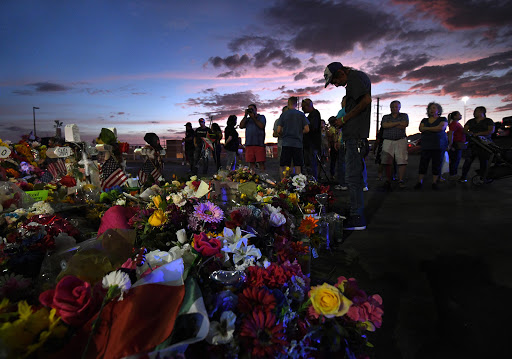Three months after the El Paso shooting, students from city discuss the shooting, aftermath

Antonio Basco stands silently at his wife’s cross as family members visit the memorial site at dusk after funeral services that day for Walmart mass shooting victim Margie Reckard.
November 5, 2019
Three months after the 2019 shooting in El Paso, Texas, Miriam Guevara still has difficulty reconciling with the massive loss of life that occurred in her hometown within the span of several minutes.
On Aug. 3, 2019, a mass shooting occurred at a Walmart in El Paso — a predominantly Latinx city — where a gunman killed 22 people and injured 24 others, leaving a racist manifesto that described that attack as a “response to the Hispanic invasion of Texas.” The shooting was the deadliest anti-immigrant attack in recent U.S. history.
“I still drive by the Walmart,” Guevara said. “I still can’t believe that someone would come and kill 22 people. For me, it’s still not real.”
The Weinberg sophomore was at a swim meet and California when she received a notification on her phone that read, “22 killed in El Paso.” She said because she didn’t hear from her parents back home, she thought the news wasn’t real.
She described her neighborhood in El Paso as a close-knit community, where everyone is “each other’s aunt or uncle.” The community’s Latinx heritage also factors in a “big family mentality,” so in the weeks immediately after Aug. 3, she said she felt her community drew even closer together after the tragedy.
Communication senior Bridget Gonzalez said was saddened that national shootings leave the minds of people outside the neighborhoods in which they occur only weeks later.
Gonzalez said while the pain of loss was shared within her community, it was strange seeing her hometown at the center of national political discourse around gun control.
She said though the shooting felt personal because it was targeted towards the Latinx community in El Paso, she and her family were able to begin moving on, in the months after. But for families that experienced losses, moving on is less of an option.
“You know, there are literally only two degrees of separation between you and anyone you can possibly know in El Paso,” she said. “You can’t just drop the conversation,” Gonzalez said. “It wasn’t just El Paso — it was so many shootings. You can’t forget them all.”
Three months after the shooting, Guevara said she finds it “devastating” not only that people outside of the city have moved on from the tragedy, but that the shooting has been politicized. Former Democratic presidential candidate Beto O’Rouke made the shooting a centerpiece in his presidential campaign, and President Donald Trump was photographed with an infant orphaned by the El Paso shooter.
Despite the routine use of the shooting as a political talking point, Guevara said she was frustrated that no gun legislation has been passed in Congress, while O’Rouke and Democratic presidential candidate Pete Buttigeig, mayor of South Bend, Indiana, continued to fight against each other on whether states should implement a mandatory buyback program.
“There has to be a cultural shift in America,” Guevara said. “At what point… how many more mass shootings need to occur for both parties to come together?”
Guevara said Trump’s tolerance and use of hateful rhetoric surrounding immigration policy and immigrants normalizes that language and validates the people who hold those ideologies, prompting them to “do whatever they felt like they needed to do.”
She urged students on campus to continue to fight for policy changes, despite the broken electoral system they must navigate to do so.
“Don’t be complacent, especially with the current administration,” Guevara said. “Stay active and vote. Believe — even though our electoral system is wrecked — still believe.”
Email: amyli2021@u.northwestern.edu
Email: daisyconant2022@u.northwestern.edu
Twitter: @daisy_conant


